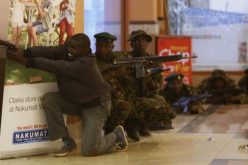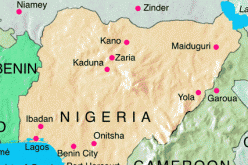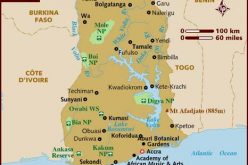
A woman at the Chiromo funeral home in Nairobi cries after she viewed the body of a relative killed in Thursday’s attack on a Kenyan university, April 4, 2015.
VOA News – Kenyan President Uhuru Kenyatta called for unity Saturday, two days after al-Shabab militants massacred 148 people on a university campus, targeting mostly Christians.
In a televised address to the nation, Kenyatta declared a three-day mourning period, appealing to Kenyans to safeguard the nation’s “peace and stability.”
“I urge every Kenyan, every church and every local leader to speak up for our unity and ensure that our justified anger does not spill over and lead to the victimization of anyone,” he said. “This would only play into the hands of the terrorists.”
Kenyatta stressed his belief that “Islam is a religion of peace and tolerance” and said “the radicalization that breeds terrorism” is conducted “in the full glare of day.”
He said the government must have information and cooperation from the parents and families of those who are being radicalized, as well as from political and religious leaders, in order to effectively combat the terrorists.
Thursday’s slaughter at Garissa University College was Kenya’s deadliest terrorist attack since al-Qaida’s 1998 bombing of the U.S. Embassy in Nairobi. That attack killed more than 200 people, mostly Kenyans.
Kenyatta promised the government would “employ all means” to bring the Islamist militants behind the university murders to justice. He said security forces were pursuing leads on the remaining accomplices and the mastermind of the attack.
Kenyatta said five of the accused terrorists had been arrested, while security forces killed four. Kenyan officials said some of the suspects arrested were trying to flee to neighboring Somalia, where al-Shabab is based.
Kenyans gathered Saturday to see the bodies of the dead gunmen, who Interior Minister Joseph Nkaissery said blew up “like bombs” when police shot them. VOA’s reporter said police put the bodies in an open truck that drove around the streets.
Other families continued to learn of their losses in the attack, viewing the bodies of their loved ones in a mortuary.
Threat of ‘another bloodbath’
An al-Shabab statement Saturday threatened “another bloodbath” in Kenya, warning, “No amount of precaution or safety measures will be able to guarantee your safety.” The group said Thursday’s attack was revenge for Kenyan military action inside Somalia.
The attackers stormed the university campus before dawn Thursday and began shooting indiscriminately. Witnesses said the gunmen later targeted Christians and freed some Muslims.
Kenyan security forces battled the militants for 15 hours and rescued more than 500 students before fatally shooting the attackers.
A Kenyan member of parliament, Mohamed Dahiye Duale, told VOA’s Somali service that the attackers had traveled from Dadab refugee camp to Garisa in a taxi before storming the university campus.
U.S. President Barack Obama, whose father was from Kenya, expressed “horror and sadness” over the attack. The White House said Obama reiterated his plans to visit Nairobi in July.
The Kenyan government is offering a $220,000 reward for an al-Shabab member thought to be behind the attacks. Mohammed Mohamud Kuno is already on a government watch list. He is suspected of being al-Shabab’s chief for external operations against Kenya.
The al-Qaida-linked group has battled the Somali government and its allies since 2006. It has attacked targets in Kenya since Nairobi sent troops across the border in 2011.
In 2013, al-Shabab claimed responsibility for the massacre in Nairobi’s Westgate Mall that killed more than 60 people.
The University of Nairobi warned its students last week that Kenyan government agencies had intelligence reports indicating al-Shabab was planning an attack on a major university, among other targets. It was not clear if a similar warning was issued in Garissa.
Another survivor emerges
The Kenyan Red Cross reported finding a female survivor of the massacre on Saturday at the college. Cynthia Charotich, 19, told The Associated Press she’d remained hidden in a closet crawl space for two days, fearing attackers might still be lurking.
“I was just praying to my God,” said Charotich, a Christian.
Kenyatta has ordered 10,000 police recruits whose enrollments are still pending to immediately report for training at the police college.
Somalia’s President Hassan Sheikh Mohamud has called for greater security cooperation with Kenya, offering his condolences and calling the attack “barbaric.” He said Friday that the killings showed the need to eliminate the “menace” of al-Shabab.










